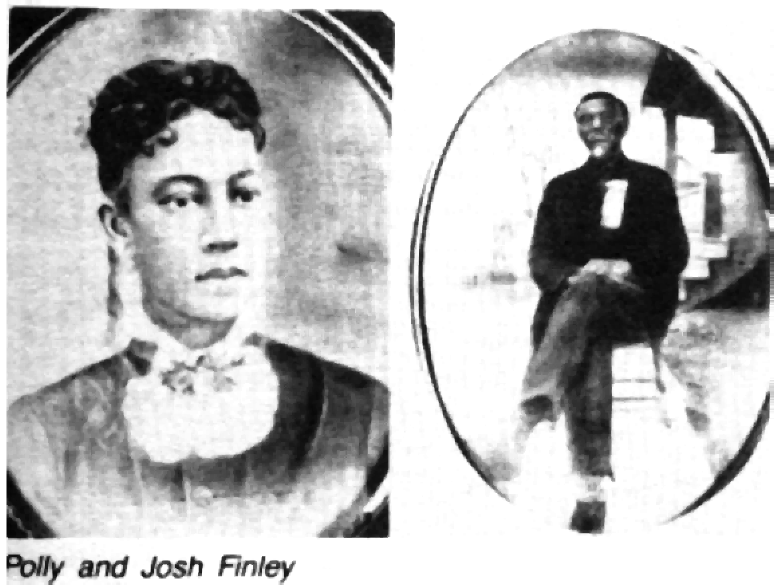Finley Family Ironton Tribune, July 25, 1976

Mrs. Flossie Copney, the great-great-granddaughter of a slave owner from Va, celebrated her 89th birthday recently. It was a beautiful Thursday afternoon in June when Mrs. Copney reminiscence about the family life of her niece by marriage.
Mrs. Copney is the last surviving member of a family of thirteen great-grandchildren of Josh. Josh was a horseman for a slave owner named Mr. Finley.
Flossie does not remember her great-grandfather’s name, only that he was called Josh. In upper Va. lived an Indian Princess named Polly, who had been stolen and sold as a slave.
The Quakers in that area got her to sue for her freedom. As a result, she was awarded her freedom, $100.00 in cash, and a horse. She took this and left upper Va. and on to the Plantation of Mr. Finley and went to work in the house where Josh worked and lived.
Mr. Finley was successful in getting Josh and Polly to marry. To this union were born several children, one of whose name was Thomas, the grandfather of Mrs. Copney. Thomas died at the age of 91.
Mr. Finley, the slave owner, had been a school teacher and had taught Josh to read and write and also taught several of the children of Josh and Polly to read and write. At this time, he was getting on in age and passed away, but before he died, he gave Polly and Josh his land possessions and their freedom.
They enjoyed the freedom with the family, but at the death of Polly and Josh, their children inherited land and other possessions, and there was no longer happiness for the children. Neighboring white felt it was too much for Negroes to own because of the pressure they were forced to sell.
They took the money and purchased three covered wagons which made the train. The fact that Josh had been a slave of Mr. Finley, he naturally took his name. It was now that Thomas Finley took his children, sisters, and brothers and left Va., traveling the mountainous roads by covered wagon and coming to Ironton.
They traveled during the warm weather leaving Va. in the spring of the year, reaching Ironton about Sept before the weather became cold. The first night in Ironton, they camped in a field on South 9th Street between Madison & Quincy Streets, now a Housing Development. They camped just across the street from the home of Mrs. Sinkford.
Mrs. Sinkford welcomed the wagon train to draw water from her well, which they carried across the street to the camp. The family camped there for a short period, then moved the wagon train onto Vesusius Furnace, where the men could go to work making charcoal. A young man who worked there named John Evans, whose father was Indian and whose mother was white, met and later married Lucy Ann Finley of the wagon train.
To this union came these children: Thomas, Addie, Ella, Rebecca, Sophie, Myrtle, Wilma, Edwin, Blanche, Arthur, and Flossie, of whom we pay tribute today, was born June 9, 1887. She was born on the Gilruth farm below Hanging Rock and attended her first school in a two-room building at LaGrange Station. Her brothers and sisters attended the school for blacks on Jefferson Street between 8th Street and Depot Square. The school was integrated in the late 1800s.

My grandmother married Jim Coston in Paris, Texas in 1900, her name is Hattie (Fields), (Finley), they moved to Hugo, Oklahoma. My mother name is Elberta Coston (Castan), born April 5,1912, Hugo, Oklahoma Choctaw County, ward 3 or 7.
Thanks for your comment, and I’m glad you found the story about your Grandmother!
Martha
Flossie is my grandmother.
You are welcome! Thank you for your comment,
Martha
Awesome thanks for this, flossie is my great grandma